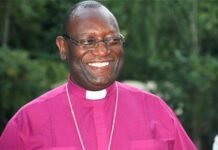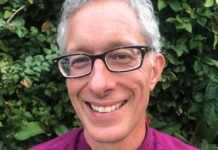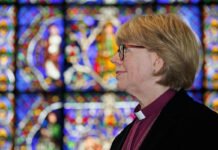New reports highlight the alarming scale of rising violence in Nigeria – much of which is directed at Christians, as terrorists attempt to Islamise the nation. That violence is set to rise as Nigeria heads towards next year’s presidential elections.
The reports confirm the findings of UK charity Release International, which serves the persecuted church, that Nigeria is tipping into a spiral of violence.
In this year’s Persecution Trends report, Release International (RI) declared Nigeria to be a country of particular concern.
Partners of RI warn that terrorists are determined to turn Africa’s most populous nation into an Islamist state.
‘In Plateau State alone, the number of Christians killed is not less than 20,000 – we have their names and addresses. And the world is silent,’ says the Anglican Archbishop of Jos, Benjamin Kwashi.
Archbishop Kwashi says Islamist terrorists Boko Haram have combined with Islamic State West Africa Province (ISWAP) with a single agenda.
‘Islamise Nigeria’
‘They have one goal – to Islamise Nigeria. And their first target is the church. Their second is Muslims who disagree with their own type of jihad. It has gone nationwide now. It has reached the South. And it is as if the government is doing nothing.’ Archbishop Kwashi is a partner of Release International.
A new report by the International Organisation for Peace Building and Social Justice (PSJ) states: ‘ISWAP is believed to have already recruited as many as 5,000 militants, compared to Boko Haram’s one time strength of around 2,000.’
And many ISWAP militants are better armed and better trained than their Boko Haram predecessors, maintains the PSJ.
They warn the rise in Islamist extremism is threatening to destabilise the region, including the Sahel, Lake Chad Basin, and parts of West Africa.
‘Many Nigerian commentators feel the Federation is on the brink of collapse [and] at greater risk than at any time since the Biafran civil war more than half a century ago,’ says the PSJ report.
Islamist terrorism is also triggering a wave of migration into Europe. A survey by the Pew Research Center found that 45 per cent of Nigerians wanted to leave their country and begin a new life abroad.
The United Nations (UNHCR) estimates some 3 million have been displaced, and the death toll now runs into thousands.
But the major emerging threat to Nigeria’s Christians, especially in the country’s North and Middle Belts, is neither from ISWAP nor Boko Haram, but from Fulani militants.
Nigerian human rights groups are claiming that ‘between 13,000 and 19,000 people [have been] killed in Fulani militia attacks between 2009 and 2021.’ And that is in Nigeria’s Middle Belt alone.[1]
Fear of an emerging genocide is being expressed by various NGOs, including the PSJ, which believes the legal definition – the deliberate destruction of a people group – is now being met. That concern is shared by the UK All-Party Parliamentary Group for International Religious Freedom or Belief.
Targeting Christians
Release International partners say Fulani militants are deliberately targeting Christian leaders.
One of many examples is the singling out of a Fulani pastor, Ibrahim, in Plateau State for murder.
Mercifully, Ibrahim’s wife Labara and their five children were away when the militants attacked. She received a call from a church member telling her to quickly return home.
‘They attacked Ibrahim in the room,’ Labara told Release International. ‘He tried to escape through the window – and as he fled, they shot him dead. I saw his body lying where he was shot.’
Ibrahim often spoke about the Christian faith with Muslims. A community leader told Release International: ‘He had been warned several times that he could be a target for killing by the Fulani Islamists ravaging the villages. But Ibrahim said he had a duty to bring the Christian message to his people.’
His widow, Labara, said, ‘I know my husband is at rest with the Lord. I know also the Lord will be with me and provide for these children’s needs.’
According to the Southern Kaduna People’s Union, Fulani militia have occupied and settled in 145 Christian communities in the southern part of Kaduna State, occupying ten per cent of the land.
Churches destroyed
A similar picture of spiralling anti-Christian violence is emerging elsewhere in Nigeria. In Benue State, the Christian Association of Nigeria estimates upwards of 500 churches have been destroyed by Fulani militia since 2011.Hundreds of others have been abandoned for fear of further attacks.
In Kano and Kaduna, the United States Commission on International Religious Freedom has described similar attacks against Christian communities as ‘systematic, ongoing and egregious.’
‘The attacks and killings are ceaseless now,’ said another partner of Release International, who cannot be named for his protection. ‘In April Boko Haram executed 20 Christians in an online video. The situation for Christians in Nigeria today is dire.
‘With government complacency and rising terrorism by ISWAP (Islamic State West Africa Province) and Islamist Fulani militia, Christians are likely to face persecution for a long time to come.’
The Release partner added: ‘We ask for prayers for God to raise men and women who will continue to stand for the Church and be voices for the vulnerable.
‘Please pray for the raising up of those who will fight for justice for the victims of this religious carnage and genocide unfolding in northern Nigeria.’
Release International partners are providing trauma counselling to victims of attacks, along with necessities, such as rice, beans, sugar, vegetable oil, soap, and salt.
Election warning
Observers warn religious tensions are set to grow in Nigeria, as the country heads for a general election in 2023. Past elections have often been marked by an increase in violence.
Says Archbishop Benjamin Kwashi: ‘All of this has sharpened our focus as a persecuted church. We’re not giving up. We will not be defeated. We have a gospel [good news] worth living for, and a gospel worth proclaiming and dying for.’
Release International is active in some 30 countries. It works through partners to prayerfully, pastorally, and practically support the families of Christian martyrs, prisoners of faith and their families. It also supports Christians suffering oppression and violence, and those forced to flee.




[…] supply […]